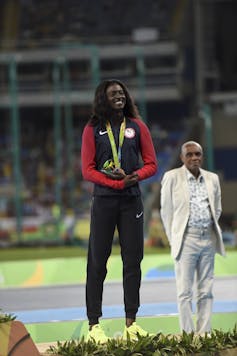Mental health after the Olympics: why many athletes struggle to adjust to normal life after major competitions
It’s like I have no energy at all. Now I can’t even summon the strength to drink a glass of water, it’s like I’m locked inside. We spend a lot of time and energy preparing for glory, but now that I’m living with it, I feel weak and helpless.”
An unknown athlete, weeks after competing in the Olympic Games.
Each athlete creates their own self-image through experiences, values and attitudes related to the strength of their training and level of achievement. The value they attach to their expectations, efforts, and suffering greatly affects their behavior, motivation, thoughts, and well-being.
But when the 2024 Olympic Games are over, many of them will be struggling to find meaning beyond the level of competition, with negative mental health consequences for some.
Mental commitment: full-time work
According to data published by the International Olympic Committee in 2023, 33.6% of elite athletes suffer from anxiety and depression, and at the end of their career, 26.4% have serious health problems mental health.
Athletes are so attached to their work and their goals (whether they achieve them or not), and put so much effort into training that they often ignore or justify their weaknesses: separation from loved ones and close friends, difficulty of maintaining public life, and always. high performance pressure.
When competitions end, or when athletes retire, they often feel lost: their daily mental activity is no longer controlled or guided by urgent, demanding challenges.

Celsp Pupo / Shutterstock
It is worth remembering the unfortunate case of American athlete Tori Bowie. A three-time Olympic medalist in Rio 2016 and a multiple world champion, he experienced a number of mental health issues while adjusting to life, and passed away due to complications from delivery at age 32.
Another tragic example is that of Jesús Rollán, a two-time Olympic soccer champion who died after his retirement after falling from a roof, in what many believed to be suicide.
Mental health: it’s more difficult than winning awards
Once the competition is over, it is common to hear an athlete (whether he won a medal or not) talking about “what comes next”, “giving a little”, or what he could have done better . It seems that their accomplishments and everything it took to get there didn’t deserve even the slightest bit of attention.
Therefore, psychological harm awaits them when they stop doing what made them important. Many experience a significant decline in health, mood swings and feelings of worthlessness, which cause more difficult problems than fighting for awards.
When they stop, the athlete’s attitude, perspective and environment change completely, and the immediate goal that motivated their performance disappears. Furthermore, the media attention or recognition that often gives meaning to their suffering evaporates.
This is the trap of success, which can only be achieved by a select few. If it is not focused on a clear head, it can wear the athlete down and cause the person to become single-mindedly dependent on the expected or expected reward.
It’s like feeling like the pillars that support them are slowly crumbling, when in fact they’re coming together. The athlete used to believe that the only fight was in the stadium, the field, the racetrack, or in the ring or the swimming pool, but now they have to face daily challenges, which also requires a lot of effort and dedication.
Time to see yourself anew
This is the time when the real person emerges, adding (or emphasizing) the values that led to their success in sports, such as humility or responsibility.
Despite the personal and emotional challenges that come after competition, the transition process (and it is a rare life transition) is a great opportunity for the athlete to grow and find their best version. . It is a moment of adjustment in which they recover from the weakness caused by focusing completely on their goals.
It will be a time to focus on their life (enjoy food, sleep, exercise therapy, get bored), feel close to the people you love (love and be loved without the need for praise) , realizing the value of everything they do (creating habits at home and away, taking up new hobbies), connecting with nature, having new habits and ways of to live, etc.
Finally, for sports professionals, retirement can be a good opportunity to explore different ways of seeing sports outside of high-level competition: to understand how children play, to see how athletes how hard the unemployed work, or how people recover using it from illness or injury.
“When all the noise is over, you realize you’ve been fighting for more than awards: you’ve been striving for something you sometimes feel like you didn’t decide to do, and you didn’t you do it. you know why you want it.”
An unknown athlete, weeks after competing in the Olympic Games.
#Mental #health #Olympics #athletes #struggle #adjust #normal #life #major #competitions